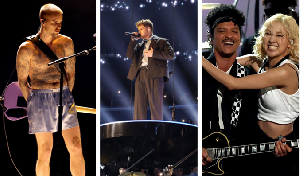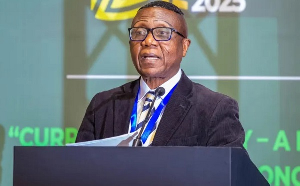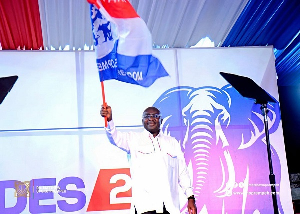Sports Sustainability : A Green Rubbing For Ghana Sports Wouldn’t Go Amiss
By : Dela Ahiawor
A recent sortie to some key sports facilities, brought home to a group of green enthusiasts, the sordid state of sporting infrastructure in Ghana. This got them started on their hobby horse: sustainability and sports. The conclusion was to give the lack of green ethics among Ghanaians the flak, as was their wont. The cue here is that, curbing wanton damages to the environment: sporting infrastructure demands that we go green or become more sustainable in our actions, in order to realize the long term goal of not compromising the needs of posterity.
Green Sports advocates therefore tend to be more forward-looking in their thinking about what future generations will inherit from the current generation. The logical conclusion from the foregoing, is that the existing infrastructure today will serve as the bedrock on which tomorrow’s future will be built – this is an apt statement in contemporary environmentalism. If sports people are agreeable to this mindset, then the preservation and conservation of all sporting facilities for future generations should be of utmost importance to all stakeholders in the sports industry.
To make a statement of fact, building these structures in the first place demands ruinous capital injection. This quickly brings to mind the four stadia built to host the African Nations Cup in 2008. It’s appalling to learn that they are all in ruins already, with the Ohene Djan Stadium in Accra recently hogging the news for losing its glamour so fast right under the watch of the National Sports Council. A situation that can be put down largely to aberrant human behaviour during sporting events:May, 9 disaster being an epic reminder- the usual lack of maintenance culture or total neglect also in the bargain.
But all these inactions, honestly underscores the lack of green or sustainability ethics in the management of sports in Ghana. The only way forward is to go green, because it provides a lifeline which can be used to salvage sports in Ghana. In fact going green will immensely help to improve environmental performance, encourage accountability, reduce waste, conserve energy and water, promote mass behaviour change at sporting events , encourage the playing of sports in a clean environment, improve the poor conditions of existing facilities and also prevent future sports infrastructural developments from going to pot as usual.
So, what then is going green or sustainability? One may ask. Expressed succinctly, going green, sustainable development and sustainability are coinages that can be used interchangeably to refer to the same thing. The term sustainability, is an evolution of the phrase going green which has gained currency in recent global development narratives. It’s open to varying interpretations, but the most comprehensive definition according to Bruntland (1987) states that sustainable development, is development that meets the needs of the present without compromising the needs of future generations to meet their own needs. Therefore implementing lifestyle changes, creativity and strategies designed to ensure the long term growth or success of an organization which leads to positive impacts on the economy, society and the environment is what the concept of sustainability is all about.
Recent concerns for the health of the earth due to human activity with regards to infrastructural developments, resource depletion and climate change has made it prudent for individuals and organizations to initiate programs or strategies to help cut carbon emissions, reduce waste and also enhance operational efficiencies to save our planetary home from total destruction. In the words of the UN Secretary- General, Ban Ki –moon: “sustainability is the imperative of the twenty -first century.” As a result, particularly in the advanced economies sustainability has become the new normal in almost all aspects of human endeavour including sports.
Sports sustainability or green sports actually demands that sports should be played with reduced impacts on the environment, in addition to reduced running costs for energy, water and waste. Consequently because sports is an integral part of the society, sports sustainability simply mandates governments, fans, sporting media, sports associations, all sporting codes, sports venue managers, sports event planners and other sports businesses to respect the environment and promote environmental stewardship. It is the duty of all these groups to incorporate sustainability messages and environmental programs into the bidding, planning, execution of tournaments and other competitions. This should be carried out with the objective of protecting the environment: sporting infrastructure for the future, promoting positive behaviour change among fans and also driving economic growth that the community and all citizens can share in.
Sustainability is a latter- day concept in sports, but the rate at which local, collegiate and professional sports associations in Europe and the USA are lapping it up is fascinating. Governments and International sports federations: International Olympic Committee (IOC), International Association of Athletic Federations(IAAF) and Federation Internationale de Football Association (FIFA) have also jumped on the sustainability bandwagon. They are priming the pump of sustainability with huge sums just to leave positive legacies in the venues, communities and countries in which their mega-events are held.
The upcoming Fifa World Cup in Brazil presents a case study for all sporting concerns interested in going green. The Fifa World Cup is the biggest single-event sporting competition in the world with severe environmental and social issues. Fifa and the 2014 World Cup, Local organizing committee (LOC) are committed to delivering a sustainable event by undertaking several green projects and activities.
Fifa is investing in zero-emission buildings, green stadiums and also installing solar panels to generate renewable energy. It is also advocating the recycling of waste during and after the tournament. To help combat global warming the carbon foot print of the tournament is being calculated with accompanying strategies to cut emissions. Sports, particularly football inspires great fervour, passion and jingoistic patriotism. So Fifa through its Football for Hope Initiative organized forums worldwide to promote the cross-fertilization of ideas on the use of football as a tool to deal with social issues. In conclusion Fifa is mandated to give its stakeholders the opportunity to peruse its green credentials by producing a sustainability report after the tournament in accordance with the Sustainability Reporting Guidelines developed by the Global Reporting Initiative(GRI).
Fifa’s commitment to sustainability whether symbolic or not is very encouraging. In 2010 Fifa invested 400,000 Euros to offset emissions produced by the tournament in South Africa. For the 2014 World Cup Fifa promised to invest 20 million dollars to implement its sustainability strategy for the game and for the world. If the prime aim of Fifa is indeed to rescue the planet earth from total destruction then these huge green strategy budgets makes a lot of sense.
It therefore stands to reason that the various sports disciplines in Ghana also jumps on the sustainability bandwagon to help reduce negative impacts on the earth. Football is the most popular sport in Ghana so it is just in order that the Ghana Football Association, GFA blazes the trail. But there is a challenge to deal with, and is the fact that sports sustainability in Ghana is something of a novelty and will be seen as a bit ambitious and a rather newfangled project to embark on by many stakeholders in the sports industry. Issues about the FA not having the wherewithal and the resources to invest into greening sports in Ghana are also likely to surface. Be that as it may, sustainability in sports is a worthy initiative not to be shooed considering its mileage in the social milieu.
The GFA ,may not have the clout of a world footballing monolith like Fifa, with all the largess and resources to easily embark on green sports programs but it can be done piecemeal until it becomes an unstoppable snowball. This is possible if it resolves to set aside a token of its monetary rewards from the World Cup in Brazil and other future tournaments for sustainability activations. This also goes for all the other sporting associations. Current and future sponsors of the Ghana Premier League must also ensure that part of their sponsorship monies go into greening programs for the various league clubs henceforth.
With all these objectives in mind the onus consequently is on the umbrella body of sports in Ghana: the National Sports Authority, NSA to quickly latch on to sports sustainability and also promote it massively nationwide. “Sports as an industry must not only grasp the green agenda, but should be leading it.” according to Gary Neville former Manchester United Captain. To be able to achieve this the National Sports Authority, must formulate a green or a sustainability policy and make it binding on all sporting concerns and their stakeholders, and also ensure that it is incorporated into their routine activities and operations. For accountability sake, the NSA should also make it mandatory for all its constituent bodies to prove their green credentials by producing sustainability reports according to the dictates of the Global Reporting Initiative(GRI).
It’s all in the name of playing sports to save the earth. Other sporting jurisdictions are getting on with green sports. So this is far from being a cock-eyed scheme, but rather the much- needed fillip to help Sports in Ghana regain its pride of place on the world’s sporting landscape.
www.sports24gh.com
-the author is a sustainability strategist at Green Sports Active-
Sports Features of Monday, 19 May 2014
Source: Dela Ahiawor
A Green Rubbing For Ghana Sports Wouldn’t Go Amiss
Entertainment











